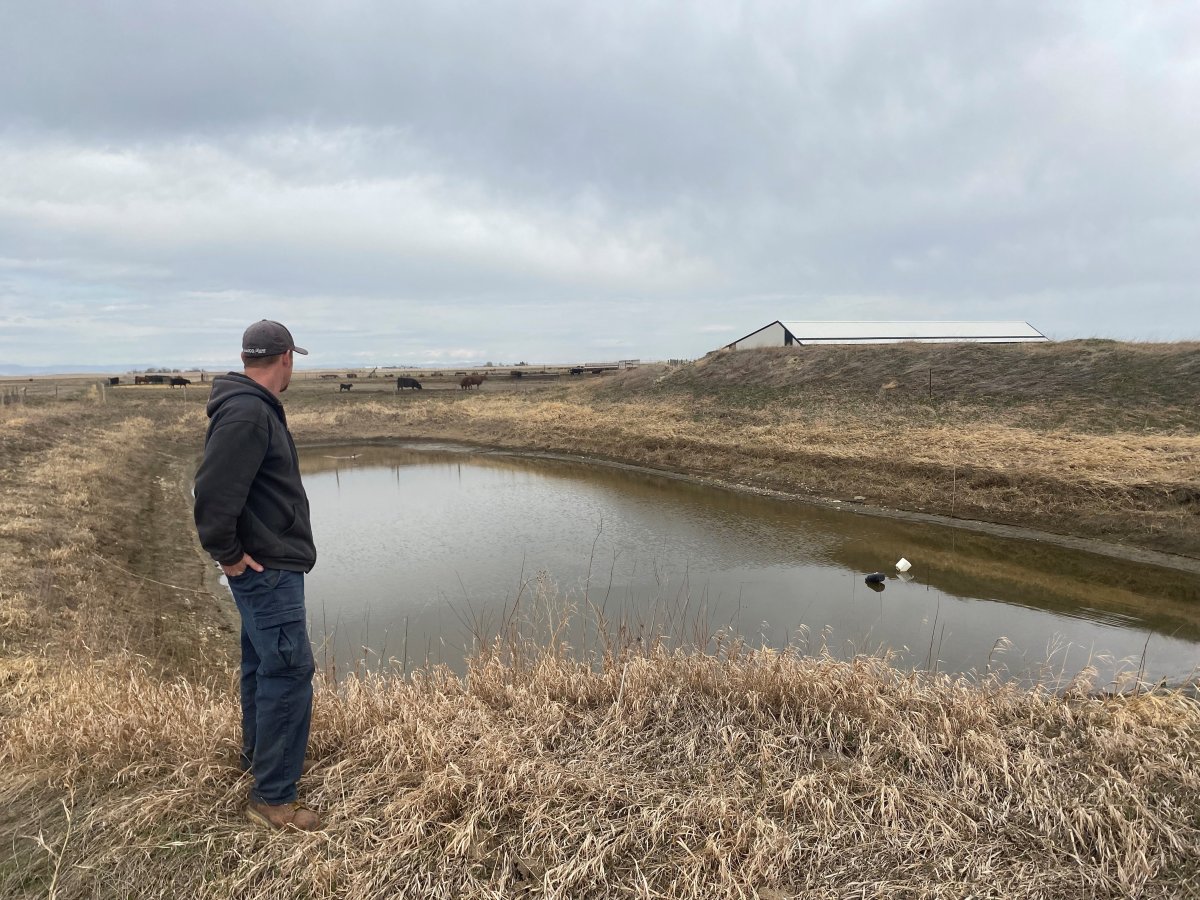Why a Southern Alberta First Nation turned off the tap to hundreds of area farmers

Troy Bischler started to panic. The Granum, Alta., area farmer was in the middle of calving season with 180 cow-calf pairs and he was running out of water.

“We maybe have a week left in the dugout. After that there is really no Plan B,” Bischler told Global News on April 27. “Either that water comes down the canal and starts filling the dugout, or I don’t know. We cannot move these cattle halfway through calving season to another water source. It will not work.”
Bischler farms in a part of Southern Alberta that doesn’t get a lot of rain. Agriculture operations supporting more than 200,000 acres of land and 750,000 head of cattle rely on irrigation supplied by the Lethbridge Northern Irrigation District. The water is diverted from the Old Man River through a canal gate on the Piikani Nation Reserve.
On April 12, the Piikani Nation leadership ordered that gate be closed.
READ MORE: Details on water blockage for Lethbridge farmers revealed, 2 weeks later
“The river is very important to the Piikani Nation,” Piikani Nation Councilor, Riel Houle said. “We understand the downstream impacts of farmers and other people who need access to the water but (we also) get very protective of our river. It’s sacred to us.”
Houle says the act of defiance was carefully considered. Twenty years after a water rights agreement was signed between the Piikani and the federal and provincial governments, Houle says a lot has changed. For one, the diversion weir on Piikani land is aging and planning for new infrastructure is underway.
“The province wants to come and build a new (weir) and the Piikani Nation wants to be a part of that because it’s a major project that his happening on our land.”
READ MORE: Willams Lake First Nation launches historic land claim settlement referendum
After five years of writing to the province with environmental and economic concerns, turning off the tap was a last-ditch attempt to get the government’s attention. And it worked. Two weeks after the gate was closed, water levels on farms dropped dangerously low. The province signed an agreement with the Piikani promising to work together on the water issue moving forward.
“The Piikani need to have a seat at the table to make sure that any work that we do on the weir or any infrastructure system is protecting the environment long term,” Alberta Environment and Parks Minister Jason Nixon told Global News the day after the agreement was signed.
The canal gate was reopened Tuesday night.
“We’re finally moving in a good direction but to be honest, it took till the (eleventh) hour for them to come and talk to the Piikani Nation and that’s what we were not happy with,” Houle said.
University of Saskatchewan Public Policy professor, Ken Coates studies Indigenous land claims disputes.
“From an Indigenous point of view, this is a source of a lot of their frustration; when we’re put out, when it’s a problem for our communities nothing happens but when it’s a problem for the non-Indigenous community it becomes a matter of crisis or urgency,” he said. So this is a really good example of the long-term and even contemporary effects of failing to resolve these historical disputes.”
READ MORE: Ottawa unveils $40B deal on Indigenous child welfare compensation
Still, for the hundreds of disputes between First Nations and groups and governments across Canada, Coates says infrastructure disrupting protests are exceedingly rare. In most cases, he says, Indigenous groups take these battles to court, where they often win.
“Then the question becomes ‘why are we not resolving them more quickly?’ The answer is simply that there has been a lot of appetite for $100-million settlements, $150-million settlements with First Nations people until recently. If you watch carefully across Canada there have been a whole series of settlements in the last six to eight months.”
Coates credits this change to procedural changes made by former Justice Minister Jody Wilson-Raybould — the first Indigenous woman to hold the cabinet position.
“She worked really hard to speed the settlement process up to get through the rigmarole of going through multiple levels of courts and find negotiated mediated settlements. The Government of Canada has now said, ‘Yes, let’s get these things off the table.'”
READ MORE: Indigenous delegates hope to inspire as world watches Canada’s reconciliation story unfold
Jason Nixon says reconciliation is a priority for the Alberta Government as well.
“We’re going to continue to work very hard with the Piikani on a partnership that is long-term on many of the issues that they’ve raised. It fits with the overall vision of our government which is to work in partnership with the First Nation communities and to make sure we can share long-term prosperity together.”



No comments:
Post a Comment